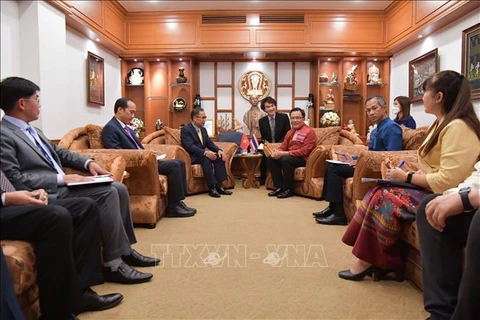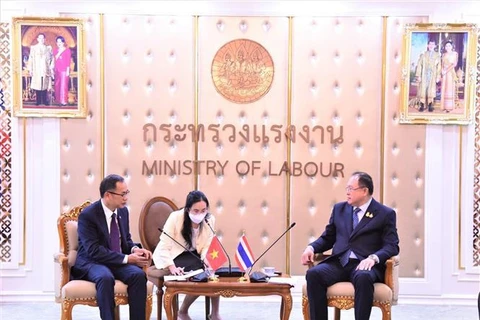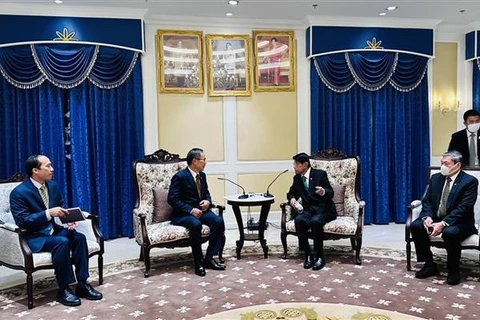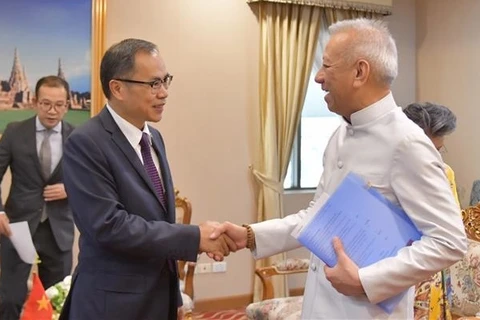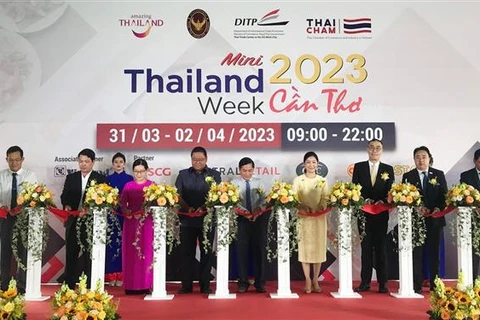 Nguyen Tuan, Deputy Director of the HCM City Investment and Trade Promotion Centre, addresses the workshop on April 5. (Photo: VNA)
Nguyen Tuan, Deputy Director of the HCM City Investment and Trade Promotion Centre, addresses the workshop on April 5. (Photo: VNA) Nguyen Tuan, Deputy Director of the HCM City Investment and Trade Promotion Centre, said economic and trade relations between the two countries have continually been expanded over the past years.
Bilateral trade stood at 3 billion USD in the first two months of 2023, including 1.2 billion USD in Vietnam’s exports and 1.8 billion USD in Thailand’s exports, respectively rising 12.4% and falling 15.2% year on year. Total trade is expected to reach the target of 25 billion USD in the near future.
He noted that Thailand has a diverse system of distribution channels, giving Vietnamese goods many chances to reach Thai consumers.
Both countries and other ASEAN members are also taking part in many bilateral and multilateral trade agreements, including the ASEAN Trade in Goods Agreement (ATIGA), the free trade agreements between ASEAN and partner countries, and especially the Regional Comprehensive Economic Partnership (RCEP) that took effect in early 2022. That has helped lift tariff barriers to exports of the two countries and also created favourable conditions for Vietnam and Thailand to cooperate in forming supply and production chains and boost export to a third country, Tuan went on.
The official held that though the countries’ export structures, especially agricultural and fishery products, are similar, Vietnamese businesses have yet to truly grasp Thai consumers’ taste and habits. Therefore, they should thoroughly learn about the market, especially technical standards, processes, and conditions to apply for local authorities’ import certificates, and apply advanced technology to processing and preservation to guarantee product quality during the transportation process.
Besides, they should also participate in more fairs and exhibitions to advertise their products, seek suitable partners, and build up the brand of Vietnamese products as quality goods with competitive prices, he added.
Sharing export experience, Director of Real Bean Coffee Van Thi Loan said the consumer market of Thailand is relatively similar to Vietnam’s in terms of products, but there are some differences in packaging and product sizes, so businesses should learn market information to make preparations and meet standards to access the Thai distribution system.
Aside from producing quality products, it is also necessary to have interesting and unique product stories, she said, noting that Thai consumers also give high priority to production sustainability such as in the use of environmentally friendly technology and recyclable packages.
It will be hard for small- and medium-sized enterprises of Vietnam to singlehandedly access the distribution system of Thailand, so participating in the Vietnamese goods weeks or trade promotion events is also an effective marketing channel, Loan suggested./.
VNA
